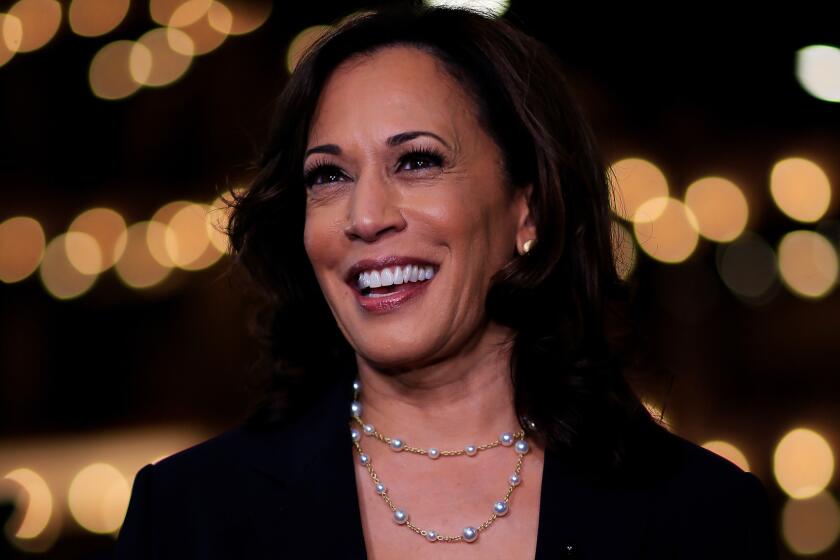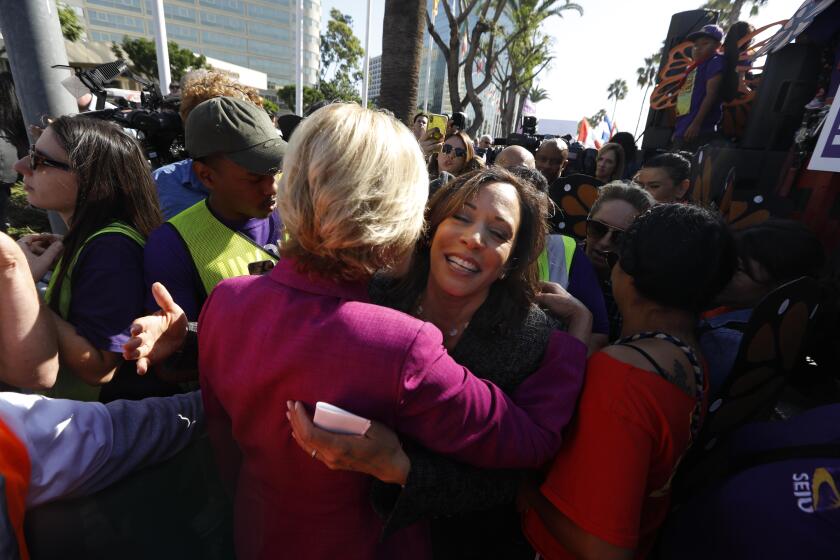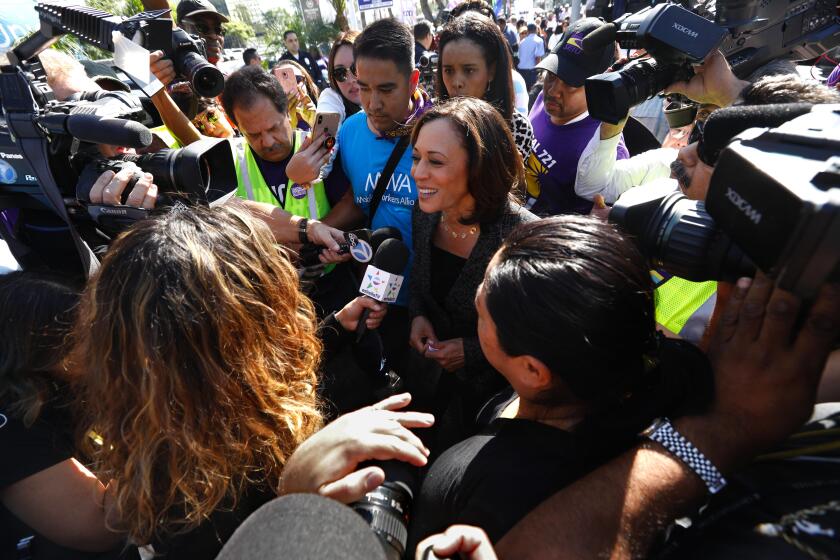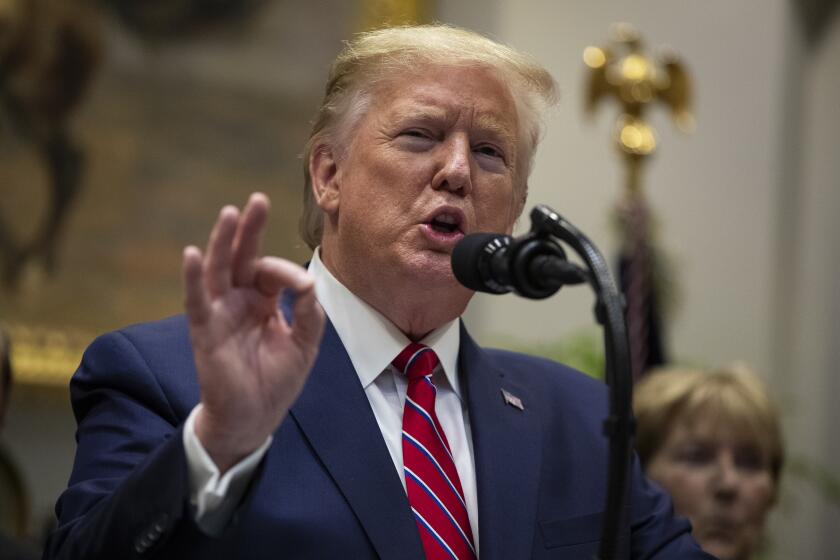Column: Kamala Harris should never have run for president
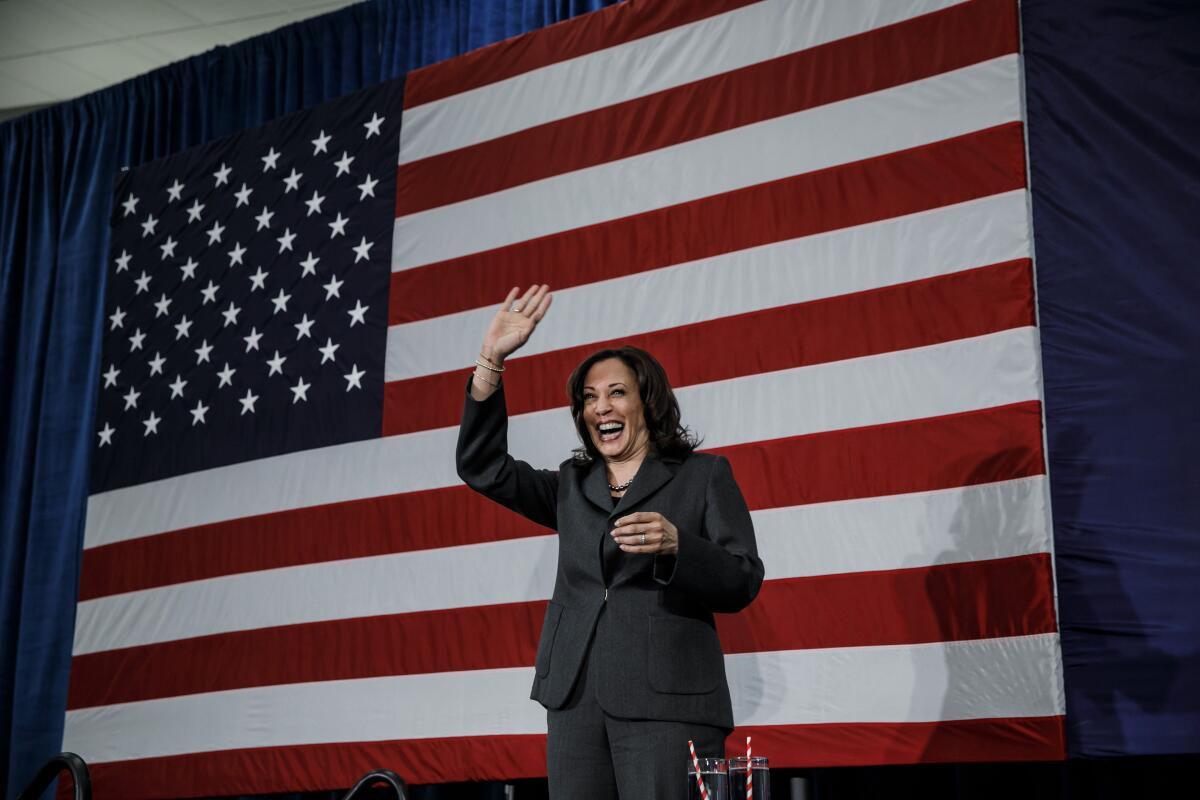
- Share via
SACRAMENTO — California Sen. Kamala Harris should never have run for president in the first place. Her ambition far exceeded her ability.
She hadn’t yet established herself in the U.S. Senate. And she hadn’t exactly excelled in her previous job as California’s attorney general. There wasn’t much of a record worth bragging about on the campaign trail.
After being elected to the Senate in a 2016 cakewalk, she should have spent the next three years focused exclusively on representing Californians in Congress, helping the state on such vital issues as water development, environmental protection, healthcare and homelessness.
RELATED: Voters wanted Harris to drop out
But people around her — political advisors and her sister Maya Harris — convinced the senator she could be a female Barack Obama and be elected the first woman president. And wouldn’t it be a kick to be the Democrat who brought down President Trump?
Most presidential candidates fail, she was told, but the smart ones come out ahead of where they started.
That’s true in a few cases, but not in most. They just fade away. And in Harris’ case, she rocketed to the top tier of candidates early, then plummeted to the ground, discarded and her campaign broke. What sort of impression will that leave? We’ll find out.
She could boost herself with Democrats by helping the party take back the Senate next year, raising money and stumping for candidates.
California Sen. Kamala Harris quit the Democratic presidential race on Tuesday, saying, ‘I can’t fund my own campaign.’
“My campaign for president simply doesn’t have the financial resources we need to continue,” Harris wrote supporters and staffers Tuesday.
But Harris’ lack of money was just a symptom of her failed presidential bid, not the root cause of its demise. Her downward slide in polls destroyed the confidence of potential campaign contributors in her ability to win, drying up the money flow. But the plunging poll numbers resulted from her inability to connect with voters.
And she couldn’t connect with voters because of the core weakness in her candidacy: a lack of cohesive strategy and clear personal convictions. There was no evidence of the political soul needed to guide her toward public policy she felt strongly about.
“She didn’t exactly have a sense of who she was and what she believed and what she wanted to get done,” said a disappointed Harris insider who asked for anonymity. “And sooner or later that stuff gets exposed.”
“Her strategic plan wasn’t clear,” the insider continued. The campaign was confident she would win the votes of African Americans in South Carolina and from fellow Californians.
OK, I admit it: A column I wrote three months ago was a real loser.
When that scenario didn’t seem to be working out, Harris belatedly began focusing on the first contest in Iowa. The senator was failing there, too, when she pulled the plug.
“She was all over the map on healthcare and criminal justice,” the insider said of the former San Francisco district attorney. “Was she a prosecutor or a public defender? It wouldn’t have made much difference which role she decided, but she started bouncing around to be all things to all people. Voters instinctively understand your heart’s not in it.”
Anyone who watched Harris as attorney general could have predicted this outcome. She refused to take positions on any state ballot proposition. Her excuse was that the attorney general writes the official ballot titles and summaries, and she didn’t want to appear biased. But that was nonsense. She was trying to avoid making political enemies, especially among law enforcement.
Most unacceptable was her refusal to take a stand on two propositions to abolish the death penalty, a cause that she claimed to have long supported. The measures narrowly lost. She also remained neutral on an initiative to expedite the death penalty. It passed. And she didn’t take a position on a measure to reduce prison sentences, which passed.
Kamala Harris burst onto the national stage as a fierce Trump antagonist but was hobbled by her cautious instincts and a muddled purpose for her presidential campaign, which she ended on Tuesday.
Yet, Harris leaped into the presidential race promising to be a “fighter for the people.” Clearly that message was gleaned from focus groups. The rhetoric didn’t match the record.
I’ve gone back and forth on Harris — initially a skeptic, then impressed and back to skepticism.
Another Harris problem that was little known outside the political world is that employees reportedly found her difficult to work with. That created a lot of staff unhappiness and it boiled over in recent weeks, creating an explosive front-page story last weekend in The New York Times.
A top Harris aide who jumped ship to another candidate left a scathing resignation letter that was leaked to the paper. One quote: “This is my third presidential campaign and I have never seen an organization treat its staff so poorly.”
A new poll from the Public Policy Institute of California shows 55% of likely voters said their main interest was ousting President Trump. Only 36% preferred a nominee who they mostly agreed with on issues.
“When your staff is knife-fighting in The New York Times and Politico, your campaign is pretty much done,” says Gil Duran, a former Harris staffer. “This was pretty toxic.”
Duran, who was also press secretary for former Gov. Jerry Brown and U.S. Sen. Dianne Feinstein, is now opinion editor for McClatchy newspapers in California. A week before Thanksgiving, he wrote a column urging Harris to drop out.
“The hard truth: Harris was a weak presidential candidate,” Duran wrote.
Harris excelled in California politics because she’s part of a home state Democratic cabal, an insiders’ machine. But that machine doesn’t work outside California.
Gov. Gavin Newsom and Harris are tight political siblings, sharing the same campaign consultant, Ace Smith. Now Newsom will miss an opportunity to stump for Harris in Iowa — and plant seeds for his own presidential campaign in four or eight years.
As for Harris’ candidacy, to paraphrase what Gertrude Stein wrote about the senator’s hometown of Oakland: There was no there there.
More to Read
Sign up for Essential California
The most important California stories and recommendations in your inbox every morning.
You may occasionally receive promotional content from the Los Angeles Times.
